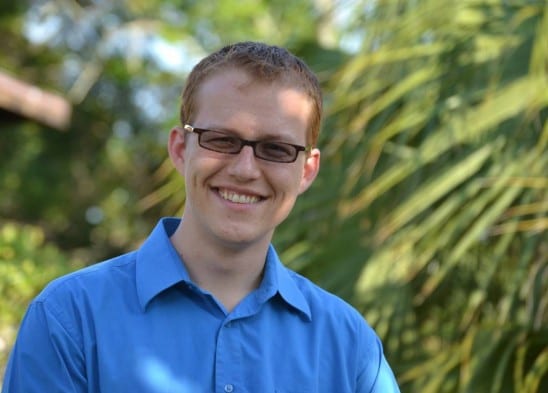COS Student Among Finalists to Travel to Mars
 If all goes according to plan, UCF graduate student George W. Hatcher will live……and die on Mars.
If all goes according to plan, UCF graduate student George W. Hatcher will live……and die on Mars.
Hatcher, pursuing his doctorate in planetary sciences, is one of two University of Central Florida doctoral students selected as finalists for a one-way mission to Mars. The other, a 29-year-old pursuing his doctorate in computer science, is Taranjeet Singh Bhatia.
Mars One, a not-for-profit foundation based in the Netherlands, plans to colonize Mars with a series of missions starting in 2024. More than 202,000 people applied to be colonists after the company issued a global call for applications in 2013. The list was winnowed to 660 in the second round, and a third round announced last week narrowed the pool to 100.
The organization’s plans call for six, four-person missions staggered two years apart, carrying a total of 24 astronauts. That means Hatcher and Bhatia each have a roughly one-in-four chance of being on one of those first colonists.
“I was speechless for about the first five minutes after reading the email,” Hatcher said. “This has been a life goal of mine for as long as I can remember.”
Hatcher, 35, decided he wanted to be an astronaut at age 3. He’s built his life around that goal, earning a master’s degree in aerospace engineering and taking a job with NASA as a flight controls engineer. For seven years, he helped repair, test and launch space shuttles.
When the shuttle program was retired in 2011, Hatcher enrolled at UCF. He now splits his time pursuing his doctorate in planetary science while continuing to work as a NASA avionics engineer.
He has twice applied for NASA’s highly competitive Astronaut Corps. Some NASA colleagues have applied unsuccessfully a half-dozen times or more.
“Every year that passes, it gets a little bit less likely that I’ll be selected as an astronaut candidate with NASA,” Hatcher said. “To see an opportunity like [Mars One] come along, I definitely didn’t want to pass it up.”
A manned mission to Mars – let alone a series of missions aimed at colonization – is an enormously complex and incredibly costly undertaking. Returning those astronauts to Earth would be so exponentially more difficult that Mars One doesn’t even plan to try.
Those selected – if they survive the 150- to 300-day trip – know they will almost certainly die there, 140 million miles from everything and everyone they have ever known. For Hatcher, that means leaving behind his wife and two young children.
“The one-way aspect of it is the cost of the ticket,” Hatcher said. “I would definitely prefer to return to Earth, unquestionably. But I’m committed enough to human space exploration that I’m willing to live out the rest of my life there indefinitely.”
Hatcher said he would not be willing to make the one-way trip if he didn’t have a religious background and believe that he’ll be reunited with his family and loved ones in an afterlife. His wife shares his Bahá’í faith and supports his plan.
The 100 remaining candidates will be tested to determine how suited they are to surviving the hardships of settling another planet. The tests will also focus on whether they can work together as a team.
Those tests will determine the final pool of 24 colonists.
The view the original article, please visit UCF Today.
